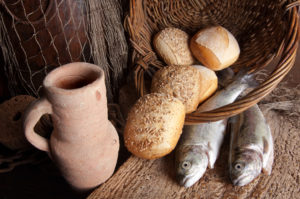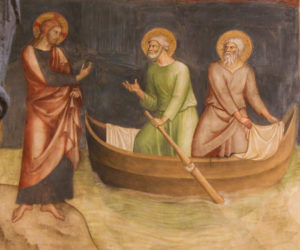Reflection on the Readings: July 29, 2018
II Kings 4:42-44; Psalm 145:10-11, 15-16, 17-18; Ephesians 4:1-6; John 6:1-15
Today’s Gospel reading is familiar to most of us; it is one of only a few miracles narrated in all four Gospels; it is the only one narrated with similar details. Today is also a departure for this year’s liturgical cycle; the last few weeks have brought us the first part of Chapter 6 in Mark’s Gospel, and Mark’s version of the feeding of the 5,000 would have followed. However, in this cycle, we jump into John’s Gospel; over the next few Sundays, we will go through the entire sixth chapter of John, reflecting on Jesus’ discourse on the Bread of Life.
Several thoughts can be drawn from today’s Gospel text; I would like to focus on one of John’s major themes – abundance.
Just as in the miracle of the wedding at Cana, today’s Gospel shows us a clear contrast of before and after – before Jesus acts, and after Jesus acts. There is a contrast between a state of emptiness, a state of chaos, and a state of abundance and order. At Cana, there was emptiness – no wine, six empty water jars, and a celebration that could potentially have drawn to a standstill. When Jesus acts, and his hour dawns, the jars were filled to the brim with the choicest of wines, and joy and celebration continued.
 Today’s story begins with the crowd following Jesus and the disciples to a deserted place. A practical problem begins to unfold: How are we going to feed all these people? Philip is focused purely on the problem and the lack of money. Where can we buy enough bread? It will take 200 days wages at a minimum. Philip suffers from a scarcity mentality, as do many of us. He thinks the only solution is money. This may be a realistic approach, but Philip misses just what Jesus’ question was. Not “How much will it cost?”, but “Where will we get enough?” Philip is focused on problem, impossibility, and scarcity; he is unable to focus on the possibilities in and with the presence of Jesus.
Today’s story begins with the crowd following Jesus and the disciples to a deserted place. A practical problem begins to unfold: How are we going to feed all these people? Philip is focused purely on the problem and the lack of money. Where can we buy enough bread? It will take 200 days wages at a minimum. Philip suffers from a scarcity mentality, as do many of us. He thinks the only solution is money. This may be a realistic approach, but Philip misses just what Jesus’ question was. Not “How much will it cost?”, but “Where will we get enough?” Philip is focused on problem, impossibility, and scarcity; he is unable to focus on the possibilities in and with the presence of Jesus.
We also should appreciate the initiative of Andrew in bringing people to Jesus; he brought his brother Simon; he and Philip brought the Greeks; and today, we read of him bringing a little boy with food. But, even as he brings the young boy, he too is questioning. What good are these for so many?
It is here that Jesus begins to act. He wants the disciples to understand he will not be bogged down by seeming impossibilities. He takes the five loaves and two fish (a perfect total, with seven being the number of perfection and completeness) and provides for all. There is abundance in what God provides.
The theme of abundance continues. We hear that not only had everyone present eaten enough, but there was enough left over to fill 12 large baskets. What a contrast to the questions and imagery from Philip and Andrew from earlier in the day!
Are we ready to be satisfied by the loving abundance of God? Are we ready to abandon fears of scarcity and look instead toward the fullness of God’s grace and mercy? How then are we to live in accordance with this Good News?
I would ask you to think about three things:
1) The Lord provides in abundance;
2) Introduce others to Jesus and watch what happens; and
3) Offer what you have, and be amazed at what the Lord can do with it.
The Lord provides in abundance. In the first reading today, the story of Elisha, we hear the Lord say, “They will eat and have some left over.” In the Gospel, we hear of the abundance remaining after all had been satisfied. For us, this means trusting that the Lord knows what we need and will provide for us, not just the minimum, but in abundance. It may be food; it may be friends; it may be spiritual support. As followers of Christ, we are not promised an easy life in this world; likewise, we do not pray for abundance of wealth, but for what is needed to bring about the kingdom of God in our lives and the lives of others. When we do the work of the Lord, he will support us; he will give us the gifts to do that work, and he will give them in abundance.
Second, introducing others to Jesus. Andrew has to be a favorite disciple for many because he is always introducing people to Jesus. Why did he bring the young boy with the food to Jesus? Would everyone else laugh at him for even thinking this child could help? Or did he think that Jesus would turn that small meal into enough for everyone? Probably not, but he took that risk. And look at what happened.

Renaissance Fresco depicting Jesus calling of Saint Peter and Andrew, in the Collegiata of San Gimignano, Italy.
It is because of people like Andrew that I was able to find a faith in Christ; it can be because of people like you that others will find that way. I hear multiple stories from people attending the Alpha gatherings of how they are discovering new ways to look at not only Christ, but at his Church, at the community, and at the love that is our God. We all should be thankful that we have so many Andrews reaching out from our simple community to those who are searching for a source of life and love.
Finally, offer what you have. Did the boy say, “No, this is mine and I’m not sharing. Get your own!”? No, he gave from what he had, and Jesus gave it back five thousand fold and more.
Charity is one of the great pillars of our faith. Watch what happens when you give without question when God asks you to give, be it your time, your skills, your treasure, or simply of yourself. Trust in God that he will take your gift and do great and wonderful things with it.
As we come forward to receive from the abundant love of God the gift of him who gave his entire self for our salvation, think about what you can do in the days to come to live your faith, to give a little, and to rejoice in the abundance of good things given to us by our Lord. And when you go forth after Mass, remember to share your faith in him who provides abundance, to invite others to share in that abundance, and pray that we may each become the stewards and disciples we are called to be. The hand of the Lord feeds us; he answers all our needs.